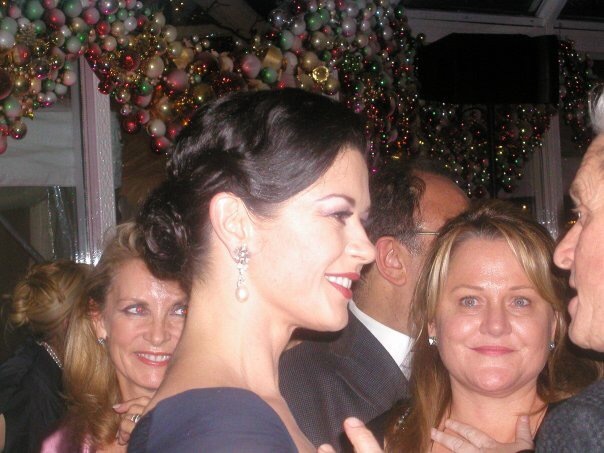The moral ambiguity of Dear Evan Hansen
#1The moral ambiguity of Dear Evan Hansen
Posted: 6/1/17 at 5:26pm
In the interview of Ben Platt from The View which is linked above in one of the BWW stories, Platt talks about the moral ambiguity of the show, stating that it's up to the audience to decide for themselves how they view Evan's lie (which he describes as "horrible" against the salutary effect it had on both Connor's family and his own character. In no way am I trying to rekindle the incredible debate that took place on this board about that issue, but I do think that it's worth noting that the creatives/cast were and are well aware of the differing views one might fairly have about the issue. I don't think that this moral ambiguity is a flaw in the show's book (as some here apparently do), I think it makes the book stronger by provoking differing views and fierce debate.
#2The moral ambiguity of Dear Evan Hansen
Posted: 6/1/17 at 5:30pm
RaisedOnMusicals said: "In the interview of Ben Platt from The View which is linked above in one of the BWW stories"
Since it won't be "above" forever: https://www.broadwayworld.com/article/VIDEO-Ben-Platt-Shares-How-He-Cries-Every-Night-of-DEAR-EVAN-HANSEN-on-THE-VIEW-20170601
#3The moral ambiguity of Dear Evan Hansen
Posted: 6/1/17 at 5:38pm
Thanks, Lizzie.
#4The moral ambiguity of Dear Evan Hansen
Posted: 6/1/17 at 5:40pm
Even so, I think the creative team (not putting any blame on the cast here, for obvious reasons) should have been aware (and honestly I'm sure that they were) that the vast majority of their fans – or, at least, serious fans – would be teenagers, oftentimes with social anxiety like Evan, and would likely relate to him and idolize him.
While I fully agree that it should be up to the person to decide if a character in a fictional narrative's actions are right/wrong (I actually gave a presentation on DEH in my Moral Philosophy class, and the responses were mixed), I don't like how the show presents Evan as such a relatable character, and gives him a happy (or at least hopeful) ending.
Unarguably, his actions were wrong, even the cast/creative agrees with that. The debate should be about whether or not he had something of a valid excuse for lying/further propagating the lie, not whether the lie was wrong or right. I think the biggest fault in the book is that there is no clear and serious moment where Evan's actions are presented as wrong, which I think is an incredibly dangerous thing for a show that has such a large teenaged following.
Search "Dear Evan Hansen" on tumblr and you'll come across thousands upon thousands of posts saying how the show helped people, and how it was amazing to finally have a character that they can relate to in regards to his mental illness. This makes me very upset, because as someone who has anxiety/depression, I could not think of a worse character to see myself in. Yes, it is good that people find some form of healing in Evan Hansen, but I personally wish that they had a better character than him to relate to.
In short, I'm not a fan of stories that spell out their "life lesson" clearly, but I am a fan of stories that at least take the time and effort to imply that their main character's actions were right/wrong. DEH never really does that, and that's the issue I take with it.
#5The moral ambiguity of Dear Evan Hansen
Posted: 6/1/17 at 5:44pm
I'd recommend everyone to watch the Bobcat Goldthwait film "World's Greatest Dad," which stars Robin Williams. It tells essentially the same story, but with a much darker and more cynical viewpoint. If the central message of "Dear Evan Hansen" is one of hope and acceptance, "World's Greatest Dad" runs in the opposite direction and suggests that some people really are worth more dead than alive, and that such a lie as Evan's, especially one embellished to continue to profit from it, is a borderline sociopathic act.
#6The moral ambiguity of Dear Evan Hansen
Posted: 6/1/17 at 5:58pm
Yes, it won't be above for forever.
#7The moral ambiguity of Dear Evan Hansen
Posted: 6/1/17 at 7:58pm
The moral ambiguity of the book is the reason I expect it to win Best Book, as well as Best Musical. I love the fact that this kid is in fact written as a kid the whole way and not suddenly this pillar of the community after everything that happens. He f*cks up, people react, and everyone moves on. Does he learn something from it all? Seems like it, but it's not the after-school special some people want it to be. What happened to the appreciation of ambiguity in storytelling anymore?
"Hey little girls, look at all the men in shiny shirts and no wives!" - Jackie Hoffman, Xanadu, 19 Feb 2008
cam5y
Stand-by Joined: 1/8/10
#8The moral ambiguity of Dear Evan Hansen
Posted: 6/1/17 at 8:21pm
"People react" in unearned ways. There is no way that any immediate family member in that situation who experienced Evan's lies would realistically say that those lies brought the family closer together. Many people's issues with DEH are not that it's not an after-school special or that it contains ambiguity. The issues are that the "everything that happens" largely happens offstage, and that a large part of the resolution is completely unearned.
#9The moral ambiguity of Dear Evan Hansen
Posted: 6/2/17 at 12:55am
leighmiserables said: "...Unarguably, his actions were wrong, even the cast/creative agrees with that. The debate should be about whether or not he had something of a valid excuse for lying/further propagating the lie, not whether the lie was wrong or right. I think the biggest fault in the book is that there is no clear and serious moment where Evan's actions are presented as wrong, which I think is an incredibly dangerous thing for a show that has such a large teenaged following.
...In short, I'm not a fan of stories that spell out their "life lesson" clearly, but I am a fan of stories that at least take the time and effort to imply that their main character's actions were right/wrong. DEH never really does that, and that's the issue I take with it."
We are clearly existing on different planets. Evan's actions aren't right or wrong - they are both right and wrong at the same time. You are trying to put him in a binary world that doesn't actually exist.
(Many spoilers below, so read at your own risk.)
* Evan's story allows him to realize that he is not trapped and he does not have to be isolated. He creates a world where he can love and be loved.
* It is also a lie that affects not just him but other people. The Murpheys are devastated by the lie.
* They are also given a new way to see and remember their son. What Evan uncovered in his "lie" was also the truth of what was underneath all the anger and isolation in Conner: a kid who wished he could connect with someone; who could at least "pretend we both have friends".
* Although Evan was too late to really touch Conner, he did redeem Conner's memory and allow Conner's story to bring help and encouragement to many many other people.
* It also never happened like Evan said.
* And many people turned in anger on the Murphys when they finally read Evan's letter. Which wasn't the suicide note it purported to be.
Every one of these things are true. How do you fit that in to a binary right/wrong? You can't. It is both. That's the moral ambiguity. It's not up to the audience to choose whether Evan's actions are good or bad. The show is laying out a whole banquet of positives and negatives.
And I think the courageous thing is that Evan owns up to both. In "Words Fail" he takes full responsibility for the lies he has told. And he doesn't weigh them against what anyone else has gained - he just takes responsibility and leaves it at that. It is an incredible model of a sincere apology. An apology which follows his uncovering of the lie - he was not found out. Rather, when he saw the pain it was causing the Murphys he owned up to try and cut off that source of pain.
In the end his experience was just what his therapist wanted him to do - visualize a world where what he has to offer is enough, and discover that he can love and communicate and be loved back for who he is. His journey was one big Dear Evan Hansen letter - only by using the lie, he found he could actually believe it.
#10The moral ambiguity of Dear Evan Hansen
Posted: 6/2/17 at 1:16am
cam5y said: "...The issues are that the "everything that happens" largely happens offstage, and that a large part of the resolution is completely unearned."
There are so many sides to this story, it is understandable that people will come to different conclusions.
For me, this is Evan's story. In my opinion the character earned every word of "Finale". It was hard fought, but he found in himself Conner's friend and he faced his failures head on and took responsibility for them. Zoe was closer to Evan than anyone, other than his mother, and she was able to put the pieces together and see what Evan was trying to do for her family. All that for me is completely believable.
cam5y
Stand-by Joined: 1/8/10
#11The moral ambiguity of Dear Evan Hansen
Posted: 6/2/17 at 3:56am
CallMeAl2 said: "cam5y said: "...The issues are that the "everything that happens" largely happens offstage, and that a large part of the resolution is completely unearned."
There are so many sides to this story, it is understandable that people will come to different conclusions.
For me, this is Evan's story. In my opinion the character earned every word of "Finale". It was hard fought, but he found in himself Conner's friend and he faced his failures head on and took responsibility for them. Zoe was closer to Evan than anyone, other than his mother, and she was able to put the pieces together and see what Evan was trying to do for her family. All that for me is completely believable."
There's a big difference between Zoe seeing what Evan was trying to do for her family, which is completely believable, and Zoe saying that his actions helped them, which is not.
And we have no way of knowing that "what Evan uncovered in his "lie" was also the truth of what was underneath all the anger and isolation in Conner: a kid who wished he could connect with someone; who could at least "pretend we both have friends"." The whole point of Connor's suicide is that we don't know what was behind his anger and isolation. Suicide means that we don't get the answers.
And it's simply not true that "[Evan] did redeem Conner's memory and allow Conner's story to bring help and encouragement to many many other people." That "redemption" was based on a lie. The "help and encouragement" were based on lies. Teenagers who kill themselves are dealing with real pain. Pretending that everyone "will be found" delegitimises that pain.
#12The moral ambiguity of Dear Evan Hansen
Posted: 6/2/17 at 9:05am
CallMeA12 said: "Evan's actions aren't right or wrong - they are both right and wrong at the same time. You are trying to put him in a binary world that doesn't actually exist."
Precisely right. Excellent analysis.
#13The moral ambiguity of Dear Evan Hansen
Posted: 6/2/17 at 9:17am
"Pretending that everyone "will be found" delegitimises that pain."
No it doesn't. It says that pain is temporary. And it is temporary. We're not talking about people who have terminal illnesses, we're generally talking about folks who don't have a complete perspective. Of course their pain is legitimate, it just doesn't justify suicide.
Evan's lies provide the families ability to find each other and themselves. It's true they don't learn anything about Colin or his pain... they still learn a lot that helps them. It doesn't let Evan off the hook but there's real benefit to the perspective his lies bring.
#14The moral ambiguity of Dear Evan Hansen
Posted: 6/2/17 at 9:21am
Such a brilliant show. I love that fact that the characters are so profoundly imperfect.
#15The moral ambiguity of Dear Evan Hansen
Posted: 6/2/17 at 9:23am
How many LGBTQ teens that have been helped by the Trevor Project actually knew Trevor?
#16The moral ambiguity of Dear Evan Hansen
Posted: 6/2/17 at 9:38am
leighmiserables said: "Even so, I think the creative team (not putting any blame on the cast here, for obvious reasons) should have been aware (and honestly I'm sure that they were) that the vast majority of their fans – or, at least, serious fans – would be teenagers, oftentimes with social anxiety like Evan, and would likely relate to him and idolize him.
While I fully agree that it should be up to the person to decide if a character in a fictional narrative's actions are right/wrong (I actually gave a presentation on DEH in my Moral Philosophy class, and the responses were mixed), I don't like how the show presents Evan as such a relatable character, and gives him a happy (or at least hopeful) ending.
Unarguably, his actions were wrong, even the cast/creative agrees with that. The debate should be about whether or not he had something of a valid excuse for lying/further propagating the lie, not whether the lie was wrong or right. I think the biggest fault in the book is that there is no clear and serious moment where Evan's actions are presented as wrong, which I think is an incredibly dangerous thing for a show that has such a large teenaged following.
Search "Dear Evan Hansen" on tumblr and you'll come across thousands upon thousands of posts saying how the show helped people, and how it was amazing to finally have a character that they can relate to in regards to his mental illness. This makes me very upset, because as someone who has anxiety/depression, I could not think of a worse character to see myself in. Yes, it is good that people find some form of healing in Evan Hansen, but I personally wish that they had a better character than him to relate to.
In short, I'm not a fan of stories that spell out their "life lesson" clearly, but I am a fan of stories that at least take the time and effort to imply that their main character's actions were right/wrong. DEH never really does that, and that's the issue I take with it."
This reads like an old criticism I once read of ALL IN THE FAMILY. Because people misunderstood what the character of Archie Bunker represented, it was the show's fault.
DEAR EVAN HANSEN clearly knows what it's trying to say, and if people on tumblr misinterpret the creative team's intent, that's their own fault.
Liza's Headband
Broadway Legend Joined: 5/28/13
#17The moral ambiguity of Dear Evan Hansen
Posted: 6/2/17 at 10:11am
And it's simply not true that "[Evan] did redeem Conner's memory and allow Conner's story to bring help and encouragement to many many other people." That "redemption" was based on a lie. The "help and encouragement" were based on lies. Teenagers who kill themselves are dealing with real pain. Pretending that everyone "will be found" delegitimises that pain.
What a crock of BS.
1.) Nowhere in the song does it suggest that every single person ever hurting, in the entire universe, will be found. Did you rail against the inspirational banner of Trevor Project's "It Gets Better" slogan, too? Because it wasn't specific enough? *eye roll*
2.) "delegitimises" (sp) is not a real word
3.) The notion that this message cannot positively impact teenagers dealing with 'real' pain (as opposed to what, exactly?) is absurd. It may just seem like empty words to you but that hopeful outlook of reassuring people they will be supported and heard is critical; especially to those most fragile in our society.
4.) The song doesn't seek out to immediately resolve anything; it's to provide encouragement and reassurance, which is a basic tenet of emotional support. Nowhere in the song does it suggest, "you will be found so... like... don't worry about anything and just stop trying. it's all good." You're adding that ridiculous subtext in your own interpretation of the piece, which I'm always weary of criticizing unless it implies a falsehood about the source material.
#18The moral ambiguity of Dear Evan Hansen
Posted: 6/2/17 at 11:45am
We are clearly existing on different planets. Evan's actions aren't right or wrong - they are both right and wrong at the same time. You are trying to put him in a binary world that doesn't actually exist.
"
Clearly we are, because I can't see a world where anyone can justify any of the actions that Evan made.
"Evan's story allows him to realize that he is not trapped and he does not have to be isolated. He creates a world where he can love and be loved." – Yes, he created a world. Not the real world. He chose to invent an alternate reality based completely on lies where he is the ultimate decider of right and wrong.
"It is also a lie that affects not just him but other people. The Murpheys are devastated by the lie." – Another reason that what he did was wrong.
"They are also given a new way to see and remember their son. What Evan uncovered in his "lie" was also the truth of what was underneath all the anger and isolation in Conner: a kid who wished he could connect with someone; who could at least "pretend we both have friends". – This is quite possibly the worst argument. Yes, Connor was clearly hurting, but I think you're forgetting the entire point of the song "Requiem," he may have been hurting, but on no planet does "I feel bad about myself" serve as a reasonable explanation for making your sibling (or anyone) feel as horribly as Zoe did.
"Although Evan was too late to really touch Conner, he did redeem Conner's memory and allow Conner's story to bring help and encouragement to many many other people." – But it's not Connor's story. It's Evan's story. Yes, he helped and encouraged people, but saying he did it to redeem Connor's memory is a fallacious argument.
"It also never happened like Evan said." – Which makes it wrong.
"And many people turned in anger on the Murphys when they finally read Evan's letter. Which wasn't the suicide note it purported to be." – Again, wrong.
"Every one of these things are true. How do you fit that in to a binary right/wrong? You can't. It is both." – It's wrong. There is nothing right about anything he did.
"And I think the courageous thing is that Evan owns up to both. In "Words Fail" he takes full responsibility for the lies he has told. And he doesn't weigh them against what anyone else has gained - he just takes responsibility and leaves it at that. It is an incredible model of a sincere apology. An apology which follows his uncovering of the lie - he was not found out. Rather, when he saw the pain it was causing the Murphys he owned up to try and cut off that source of pain." – If you think that the reason Evan told the truth was because of the "pain it was causing the Murphys," you've clearly missed something. Evan told the truth because it was starting to effect him negatively, not any other way around. Jared left him. Alana left him. His mother gave up on him. I will give him credit for sorting out his priorities and realizing that those are the people who matter most to him, however, he still told the Murphys to alleviate his own guilt and get the best possible outcome for him.
"In the end his experience was just what his therapist wanted him to do - visualize a world where what he has to offer is enough, and discover that he can love and communicate and be loved back for who he is. His journey was one big Dear Evan Hansen letter - only by using the lie, he found he could actually believe it." – Sure, but nowhere in the law of attraction (which is essentially what the letters are supposed to be) does it say "get other people mixed up in my lie and ruin their lives."
...
Obviously, people are going to be in different camps and I have no way of convincing you of how blatantly messed up the story is, but not in a thoughtful way, more in a "Ben Platt is such an amazing performer that he makes you forget that Evan's actions are borderline sociopathic" way. (Which is honestly one of the many reasons I genuinely think he deserves the Tony.) And you're not going to convince me that anything Evan did is anything but totally wrong. But regardless, forums are places for discussions, so feel free to continue.
My last point of contention is this: If Evan didn't have the mental illnesses that he had, would people be as forgiving of him? Say it was Jared who got into this mess instead of him (please don't use the argument that Jared wouldn't have gotten into this situation: it's what hypotheticals are for), would you think his actions are anything but wrong? Or is it because people find Evan relatable that he's forgiven, because "well, I'm kind of like that guy so if I did something like that, I'd want people to understand my side of the story too." Because that's where the danger lies, in my opinion.
#19The moral ambiguity of Dear Evan Hansen
Posted: 6/2/17 at 11:55am
leighmiserables said: "Obviously, people are going to be in different camps and I have no way of convincing you of how blatantly messed up I THINK the story is"
Fixed that for you.
You are not the arbiter of morality, you don't get to decide how other people feel, and you have an entire thread of people who clearly feel differently about this show. The non-binary morals and deeply thought-provoking subject matter are one of the things I love most about it. I think it's extremely hyperbolic to call Evan an irredeemable sociopath, but you are of course entitled to your opinion, and obviously nothing anyone would say would ever convince you otherwise. Not really worth the energy to argue about it.
Oak2
Leading Actor Joined: 8/11/16
#20The moral ambiguity of Dear Evan Hansen
Posted: 6/2/17 at 12:16pm
I'm also someone with anxiety and autism issues, and watching the show made me uncomfortable, but not necessarily because of the character's portrayal or actions. I did find the actions a mix of good and bad - Evan's actions I found as something he kind of fell into with good intentions, and that he felt more trapped than anything to the point that telling the truth was no longer an option - not that it makes it right, but I could empathize with how he was thinking. The only point where I feel that he probably made a mis-step is where he did the Project out of fear of being alone again - but while they may be morally questionable, I could totally understand how he did it out of fear.
Also, I felt part of the point of the show, at least what I took from it, is that ultimately everyone is doing things (at least subconsciously) for selfish reasons, even if it also has a positive effect or is also being done for others. Evan's classmate who helps spearhead the project for most of the show made me feel the show that she was taking an opportunity to make herself feel better moreso than anything else.
The biggest problem I had was that it ultimately told me that Connor killing himself was a good thing, because people were able to use it to make themselves feel better. The overall meaning I took from the whole thing is how people use other people's tragedies for their own benefit. I agree with an earlier statement that Connor felt more like a tool than anything. That, combined with the fact that the entire audience was roaring with laughter every single time Evan did anything even slightly awkward or anxious, made me leave the theater legitimately wanting to kill myself - I saw myself in Evan, and I saw the audience laughing at him every damn time he even spoke, so I felt the audience essentially laughing at me and treating me as an object of ridicule. To be fair a lot of that is a problem with the audience moreso than the actual writing (though the actor's portrayal may have had an effect?).
In any case, as said, the combination of the show and audience reaction to it making me feel like people like me are just to be ridiculed along with the presentation of someone having more positive impact on everyone through his death and the use of his death than anything he did while alive, convinced me I should kill myself by the end of the show. The only reason I didn't kill myself right after the show was because I still had tickets to Hello Dolly, which did ease it for a bit, but those thoughts still keep coming up every time I remember the show now.
Of course, everyone's view of the show is valid, and I can understand people who enjoyed it or who took different meanings from it. I am only explaining my personal take on it and how it affected me personally.
#21The moral ambiguity of Dear Evan Hansen
Posted: 6/2/17 at 12:17pm
You are not the arbiter of morality, you don't get to decide how other people feel, and you have an entire thread of people who clearly feel differently about this show. The non-binary morals and deeply thought-provoking subject matter are one of the things I love most about it. I think it's extremely hyperbolic to call Evan an irredeemable sociopath, but you are of course entitled to your opinion, and obviously nothing anyone would say would ever convince you otherwise. Not really worth the energy to argue about it.
"
I fully agree that I am not the "arbiter of morality," however, most of the things I have stated are not my opinions, but blatant facts based on the way modern, Western society defines things as right or wrong. Morality has to be objective – at least within a single society – in order for it to mean anything. Otherwise, anything can be justified as "a personal belief." Taking into account the way the world (or at least America, where the story takes place) works, I honestly just cannot understand how anyone can think Evan's actions were even partially correct by anyone's standards, and no one has given an argument as to why that cannot be easily debunked.
I don't see why people can't just agree that Evan's actions were wrong and go from there. I feel like the piece would be much more powerful that way. Or at the very least, I wish someone would present me with some proof that Evan's actions were not totally wrong, so that I could at least comprehend where you're coming from and be able to have a more intelligent discussion about the nuances of the story. Using arguments such as "he helped the Murphys heal" or "he honored Connor's memory" are moot points, because never was helping other people Evan's intention. If he had intended for anyone else to benefit from his lie other than himself, then that would be a different story. However, that's getting into the extremely nuanced discussion of non-consequentialism vs. consequentialism, which is a discussion that none of us have the time nor authority to delve into.
(All that being said, I must admit this thread has made me almost warm up to the show due to the amount of discussion it spurs. However, I still wouldn't say I like it because something being controversial and thought-provoking is hardly enough reason to call something good)
#22The moral ambiguity of Dear Evan Hansen
Posted: 6/2/17 at 12:18pm
Do you really think people will emulate this? REALLY? Oh dear lord....it's a story, and the audience knows this.
#23The moral ambiguity of Dear Evan Hansen
Posted: 6/2/17 at 12:28pm
dramamama611 said: "Do you really think people will emulate this? REALLY? Oh dear lord....it's a story, and the audience knows this.
"
That's not what I intended to say, however, I can see how it'd be interpreted as such so I apologize for my poor phrasing. What I meant was that people are excusing Evan's actions because he's such a relatable and realistic character, and I find that dangerous because people are letting a sad backstory and some unintentionally positive effects cloud their judgment on what should really be a cut and dried case of "what not to do when the school bully's parents accuse you of being their dead son's best friend."
#24The moral ambiguity of Dear Evan Hansen
Posted: 6/2/17 at 12:35pm
"people are excusing Evan's actions because he's such a relatable and realistic character"
I don't think most people are excusing his actions. I think a lot of people realize that really good people can do really bad things. Really bad people can do really good things. Sometimes "objectively" bad things end up making the world better and sometimes "objectively" really good things make the world worse. A lot of people don't think much in the real world is "cut and dried."
#25The moral ambiguity of Dear Evan Hansen
Posted: 6/2/17 at 12:36pm
leighmiserables said: "Using arguments such as "he helped the Murphys heal" or "he honored Connor's memory" are moot points, because never was helping other people Evan's intention."
Per Ben Platt's interview on Colbert, he said (while setting up his performance of "For Forever" ), "Evan has been invited over to dinner by this kid's family, and they have been led to believe that he was the friend of their son, and his plan when he goes into dinner is to sort of diffuse that, or make sure that the situation ends right there, however the mother of this kid is so in need of something to hold onto, some sort of memory, that Evan starts to sort of fabricate this story about a day that they had, a friendship that never existed, and in doing so really physically [visibly?] helps this mother to heal, and also finds that he gets to heal himself and finds sort of an answer to his loneliness that he didn't expect to find." (I just pulled that from YouTube, so it's word for word.)
There's no question that what Evan did is "wrong" in a binary sense - you don't make up giant lies about a dead kid, we all know that - but I don't think it's accurate to say that it happened for sociopathic, selfish reasons at all - he felt caught in this moment of witnessing a mother's profound grief, and as someone with no social skills, had no clue how to handle that. And as the lie spiraled, he felt less and less in control, and we see that devolution throughout the show, climaxing with "Words Fail" when his regret and sorrow about the whole thing come bursting out of him.
His mother unconditionally forgiving him at the end after doing something so awful ("your mom isn't going anywhere, your mom is staying right here" ) is the moment that smacked me in the heart the most, because as an audience member we know what he did is essentially unforgivable, and he's in the lowest of low places, but his mom offers a tiny glimmer of hope and support. To me, that's one of the biggest takeaways of the show. Most of us have someone in our life who would love us fiercely no matter what, and that's a comforting thought... especially for those of us who struggle with anxiety or deal with any form of mental illness.










